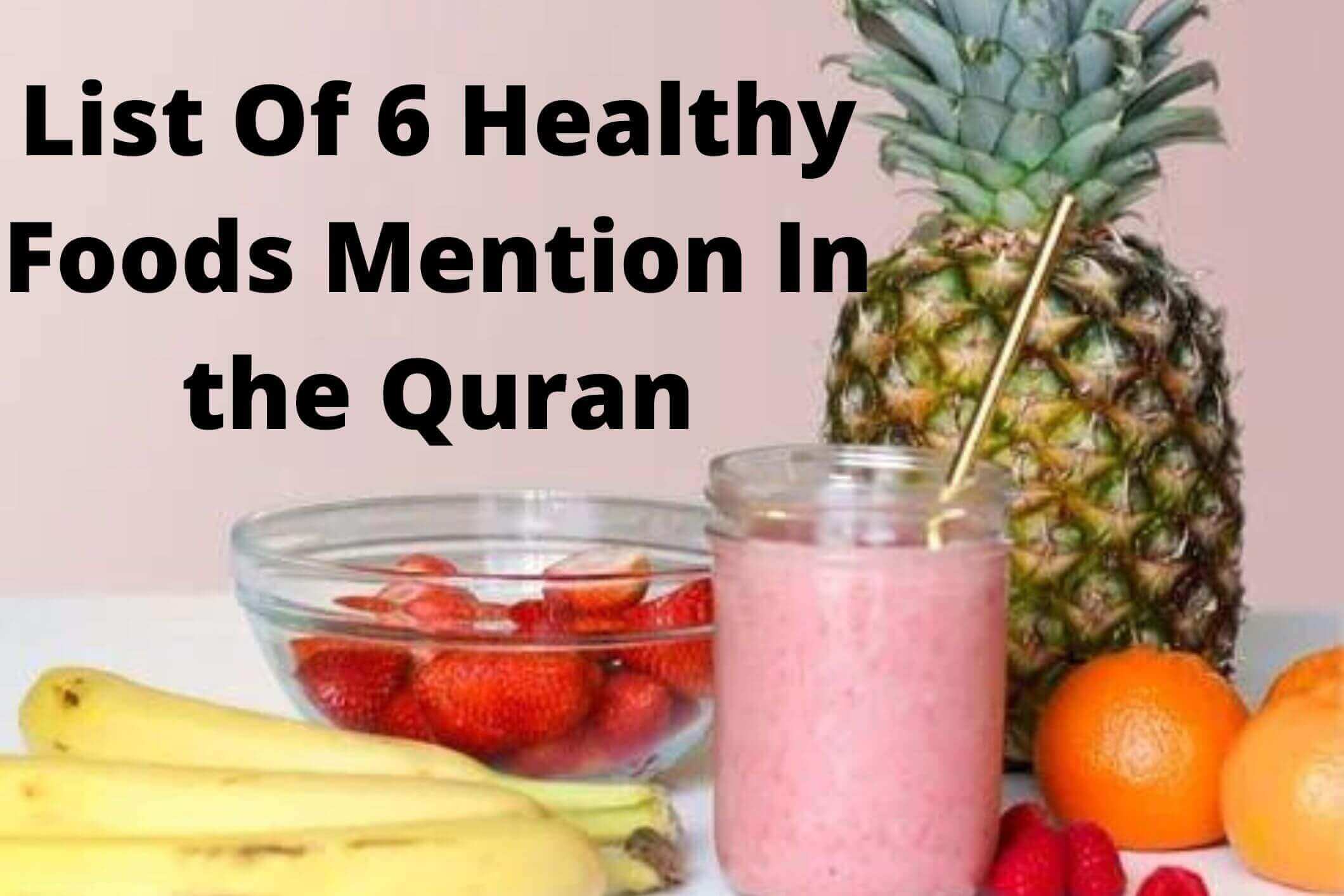List Of 6 Healthy Foods Mention In the Quran

List Of 6 Healthy Foods Now, I’ll tell you that the Holy Quran recommends and
that could improve your health.
I. Bananas
Verses 27–33 of Surah Al Waqiah can be found in chapter 56 of the Quran.
Bananas are explicitly named as one of the blessed fruits in the Quran,
and the book includes several references to fruit in general.
Bananas, full of the electrolytes and vitamins you need to get through the morning,
are a perfect supplement to any meal you might consume in the morning.
Potassium maintains healthy muscle and bone structure in addition to its
role in maintaining fluid balance and nerve function. Amino acid synthesis,
and thus healthy protein function, requires vitamin B6. When frozen,
bananas become the ideal base for ice cream and other frozen treats.
If you’re looking for a banana-based dessert recipe, you should try my
healthy chocolate chip ice cream, which only requires three ingredients.
Number 2: Olives
The fruits recommended for consumption are listed in Surah Al Mu’minun (chapter 23, verse 20) of the Quran.
As I said in my piece about Sunnah foods, olive oil is a healthy addition to anyone’s diet for several reasons.
Most people know that olive oil is preferable to other types of fats, but few would pass up the opportunity
to enjoy the fruit or “condiment to eat” in its own right. Olives not only include polyphenols,
which have antioxidant characteristics, but also the vital fatty acids that are beneficial to heart and brain health.
3. Pomegranates
Verse 68 of Surah Ar-Rahman can be found in the book of the Quran.
Vitamin C, which is abundant in pomegranates, serves numerous critical roles in the body.
Collagen synthesis is essential to the maintenance of muscle, bone, and skin, and vitamin C
also aids in iron absorption and many other metabolic processes.
Juicing pomegranates has grown increasingly common,
but eating the fruit is the most satisfying option.
The juice is devoid of vitamin C (which is typically added back in) and fibre.
The pomegranate fruit itself provides over half of the recommended daily intake of fibre and vitamin C,
so preceding the juice is a smart choice. In my post, “Simple Swaps: Juice,” I explain why and
how you should choose whole fruits instead of juice whether cooking or drinking.
Grapes Are Number Four On The List
Quranic verses 23:19–20 can be found in the surah known as Al Mu’minun.
The high levels of antioxidants in grapes have made them extremely popular.
Flavonoids found in grapes have been connected to cancer prevention and
have been proved to be useful in counteracting oxidative damage.
Despite the fact that this is an area that has been studied extensively,
it is still vital to remember that there is no miracle food that will keep you healthy and disease-free.
Dried grapes (raisins) are still a healthy option because their antioxidant content is the same as fresh grapes.
The serving size drops to roughly a quarter cup if you include raisins.
5. Figs
Figs are so important to Islam that they have their own chapter in the holy book (Surah At-Tin chapter 95)
Because of their high fibre content, figs support normal glucose and lipid metabolism.
Magnesium, a mineral vital to bone health and cellular energy balance, is also present in figs.
Dried figs are a popular snack, but like with other dried fruit, you should watch your sugar intake.
It’s crucial to check the label to avoid obtaining the extra sugar that many brands add to dried fruit.
6. Dates
Dates, the “fruit of the desert,” are mentioned numerous times in the Holy Quran and are also a part of the Sunnah.
More than a twentyfold occurrence in the Holy Book.
There are a plethora of studies documenting dates’ positive effects on health.
Dates include natural sugars like fructose and glucose, making them an excellent
source of energy in addition to being a fantastic supply of protein, fibre, and vitamins.
Many studies have shown that eating dates can assist maintain a healthy nervous system
and lower the risk of cardiovascular disease and stroke. Dates are a fantastic fruit to incorporate into your diet;
they are sometimes called a “superfood” due to the high concentrations of minerals and vitamins they contain.
